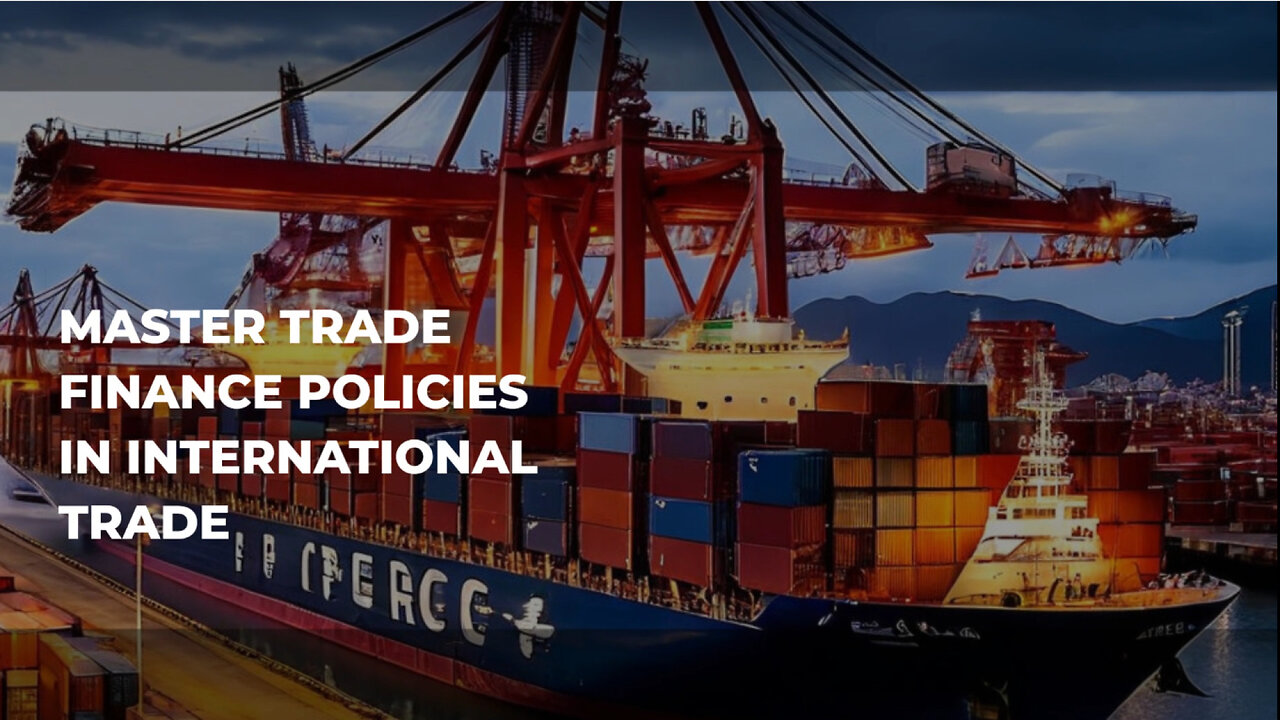Premium Only Content

Trade Finance Policies: Navigating the Rules of International Trade
ISF Template | 562-453-7357 | isf@isftemplate.com | www.isftemplate.com
Welcome back to our channel focused on customs brokerage and international trade. In today's video, we will be exploring the topic of trade finance policies and how they govern transactions in international trade. Trade finance policies are a set of guidelines and rules that outline the roles, responsibilities, and obligations of various parties involved in a trade finance transaction. These parties include exporters, importers, banks, insurers, and government bodies. The primary purpose of trade finance policies is to mitigate risks, ensure customs compliance, and facilitate smooth trade flows. They achieve this by providing mechanisms such as letters of credit, export credit insurance, and Importer Security Filing (ISF) to protect parties from non-payment or default, ensure customs regulations are followed, and comply with necessary security measures. Compliance with trade finance policies is crucial, as failure to do so can result in delays, penalties, or even the seizure of goods. Customs brokers play a vital role in assisting importers and exporters with navigating these policies and ensuring smooth trade transactions. By familiarizing themselves with trade finance policies and working with customs brokers, importers and exporters can navigate the complexities of international trade with ease. Thank you for watching, don't forget to subscribe, leave your questions and topics for future videos, and stay tuned for more content focusing on customs brokerage and international trade.
#usimportbond
#isfcustomsbroker
#uscustomsclearing
#isfentry
Video Disclaimer Here: This video is designed for education and is unaffiliated with US government bodies.
-
 1:00:38
1:00:38
PMG
16 hours ago $1.31 earnedCarnivore & Dr. Shawn Baker - Health Starts With Food
12.7K2 -
 1:28:13
1:28:13
Kim Iversen
17 hours agoCancelled Chef Pete Evans Exposes The One Change That Could End Big Food and Pharma
86.2K80 -
 4:20:21
4:20:21
Nerdrotic
18 hours ago $80.01 earnedDaradevil Born Again, Comics Industry CRASH, Neu-Hollywood REBUILD | Friday Night Tights #337
242K53 -
 1:32:34
1:32:34
Glenn Greenwald
14 hours agoThe Future of Gaza With Abubaker Abed; Journalist Sam Husseini On His Physical Expulsion From Blinken’s Briefing & Biden’s Gaza Legacy | System Update #391
125K98 -
 1:34:48
1:34:48
Roseanne Barr
17 hours ago $25.17 earnedWe are so F*cking Punk Rock! with Drea de Matteo | The Roseanne Barr Podcast #83
97.1K82 -
 1:08:20
1:08:20
Man in America
18 hours ago🇨🇳 RedNote: A CCP Trojan Horse Deceiving Americans? w/ Levi Browde
51.4K72 -
 3:55:11
3:55:11
I_Came_With_Fire_Podcast
21 hours agoTrump SABOTAGE, LA FIRE CHIEF SUED, and BIDEN’S LAST F-U!
34.6K13 -
 2:59:47
2:59:47
Joker Effect
12 hours agoUkraine in a video game? Hardest thing I have done. S.T.A.L.K.E.R.2 Heart of Chornobyl,
116K8 -
 1:15:22
1:15:22
Flyover Conservatives
1 day agoEczema, Brain Fog, B.O., and Gas… Eating Steak and Butter Creates Ultimate Health Hack - Bella, Steak and Butter Gal | FOC Show
86K7 -
 51:58
51:58
PMG
16 hours ago $3.47 earned"Can the Government Learn from Elon Musk’s 70% Labor Cut? A Deep Dive into Inefficient Agencies"
61K3